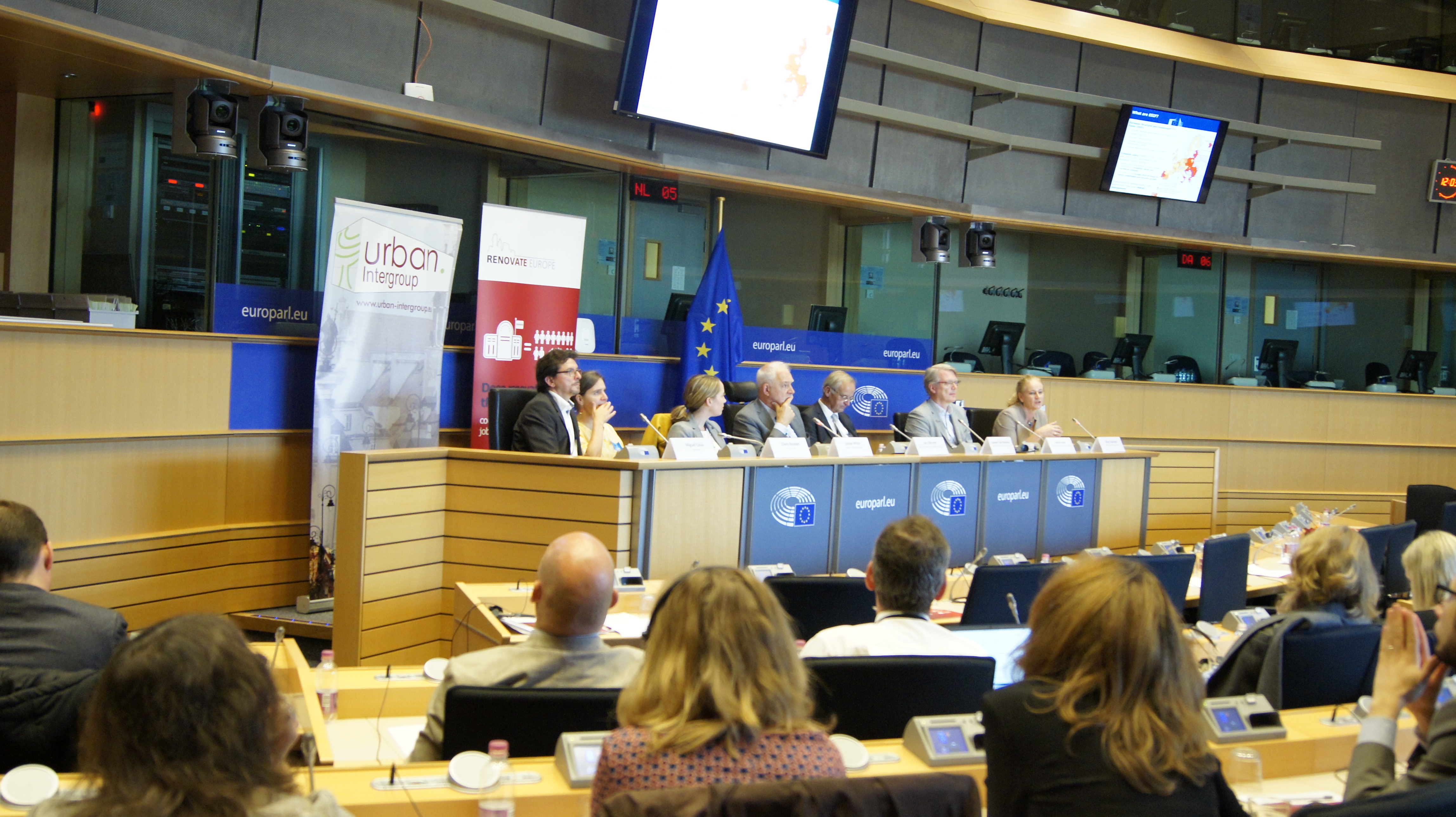Funding for energy renovation as a stimulus for urban regeneration- last event in Brussels
 The URBAN Intergroup and Renovate Europe organized a joint event on the topic Funding for Energy Renovation as a Stimulus for Urban Regeneration on Tuesday 26th September. The event was held in the context of the ongoing negotiations on the review of the Energy Performance of Buildings Directive, due to be voted in the EP early October, and sought to draw a link with available funding and opportunities to help Member States implement buildings-related legislation, through the Juncker Fund, the EIB and the current and possibly the next Multi-Annual Financial Framework, but also raising awareness about successful local initiatives.
The URBAN Intergroup and Renovate Europe organized a joint event on the topic Funding for Energy Renovation as a Stimulus for Urban Regeneration on Tuesday 26th September. The event was held in the context of the ongoing negotiations on the review of the Energy Performance of Buildings Directive, due to be voted in the EP early October, and sought to draw a link with available funding and opportunities to help Member States implement buildings-related legislation, through the Juncker Fund, the EIB and the current and possibly the next Multi-Annual Financial Framework, but also raising awareness about successful local initiatives.
“Energy renovation projects in urban areas is like inviting a whole city to go on an Easter egg hunt, to uncover the hidden treasures and multiple benefits that can be unlocked”, said Claire Roumet, Executive Director of Energy Cities. “Energy renovation can completely change the metabolism of a city – the positive impacts can be so significant that it can lead to a complete urban transformation, at all levels.”
MEP Jan Olbrycht, President of the URBAN Intergroup, acknowledged the key role of energy renovation as an opportunity to roll-out a comprehensive urban strategy with the aim of tackling energy poverty, boosting social cohesion and triggering local jobs. But MEP Olbrycht was also keen to emphasise the need that urban regeneration be an inclusive process which preserves the patrimonial heritage and improves the quality of living for all residents involved.
“Energy renovation can and must serve as entry point to engage the local community to interact on a common discussion that goes wider than just buildings and housing, to improve quality of life for all”, agreed Claire Roumet.
The redistributional value of targeted renovations is well-known, delivering undeniable benefits to lower income groups through lower energy bills and improved living standards. But this urban regeneration also occurs in skyscraper-filled business quartiers needing a much-needed human touch, or high density residential areas thirsty for more green spaces or community facilities.
“Energy renovation targets not only deprived areas”, said Adrian Joyce, “Energy renovation can be the first step to boosting social cohesion, civic pride and to improve the quality of life for all different types of neighborhoods”.
In terms of financing for urban energy renovation projects, speakers agreed that investment criteria need to go beyond simple profitability and short payback to include also the less tangible indicators such as improved quality of life and social benefits.
Miguel Casas from CITYnvest, emphasized the key leadership role of public partners in this respect, in order to increase the ambition and investment possibilities in energy renovation projects.
Despite the systemic challenges inherent to the energy renovation market, signals are nevertheless emerging which indicate a growing appetite for energy renovation projects on the ground. Encouraging figures from the European Investment Bank show a three-fold increase since 2012 in Energy Efficiency lending, with 75% of these funds being delivered to buildings. And minimum allocation requirements for low-carbon introduced for the EU cohesion policy funding in the 2014-2020 Multi-Annual Financial Framework have so far yielded a tripling of allocations for energy efficiency compared to the previous period, with overall allocations well beyond the minimum legal requirement, contributing among other things to an expected 875,000 renovated dwellings.
“The bottom-up push from empowered and motivated cities and regions, convinced about the multiple benefits that energy renovation can deliver to urban areas, is an important factor that can drive the energy renovation market”, explained Lambert Van Nistelrooij, Vice-President of the URBAN Intergroup. “The role of cities and local authorities is increasingly gaining prominence, as they are the ones who witness first-hand the positive domino-effect from energy renovation projects.”
Renovate Europe is a political communications campaign with the ambition to reduce the energy demand of the building stock in the EU by 80% by 2050 compared to 2005 levels through legislation and ambitious renovation programmes. This will bring the energy performance of the entire building stock in the EU to a Nearly Zero Energy (NZEB) performance level. Renovate Europe brings together 36 partners from across the building value chain (trade associations, companies, trade unions, city networks and 14 national partners). Almost 100 MEPs have signed the Renovate Europe Manifesto to STOP Energy Waste in Buildings (http://renovate-europe.eu/themanifesto/about-themanifesto/language-versions/)



